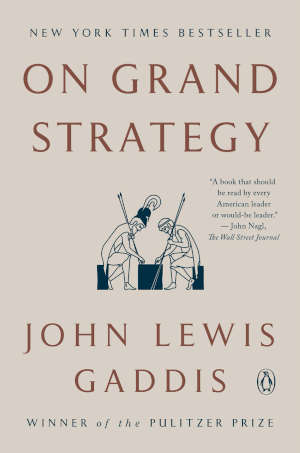What do such disparate characters as Tolstoy, Herodotus, Jane Austen, Steven Spielberg or Scott Fitzgerald have to do with Clausewitz, Sun Tzu, Pericles or Philip II? Apparently, nothing. However, a careful reading of On Grand Strategy sample them as instruments that the author, John Lewis Gaddis, uses with great skill and impressive erudition to illustrate basic principles of the concept of "grand strategy", a term he uses to elevate strategy when "the stakes" are high. Anecdotally, in this he departs from the approach that thinkers such as Liddell Hart give to the term, defined by the Briton as the coordinated and synchronised use of all elements of national power in pursuit of the objectives of strategy.
Gaddis, professor of History at Yale University and director- founder of the Brady-Johnson Grand Strategy Program, condenses in this book the result of years of teaching in such important centres from the point of view of the study of strategy as the high school of Naval Warfare in the United States or Yale University in the same country, to draw up a sort of somewhat heterodox treatise on strategy in which, alongside the authors of "canonical" literature such as Sun Tzu and Clausewitz, universal figures from literature, politics, cinema and even religion are combined with great balance and skill to illuminate his arguments.
In order to argue and present the principles of grand strategy, Gaddis follows a diachronic approach that allows him to confront characters separated by centuries, who enter into a kind of "strategic dialogue" from which the author draws his lessons. And he does it with such skill and mastery that result is harmonious and convincing, as well as very clarifying.
Thus, on the Greek poet Archilochus' maxim "the fox knows many things; the hedgehog knows only one, but a very important one", we see in one chapter Xerxes and Artabanus related to characters chronologically closer to us such as Isaiah Berlin to show the reader the idea that the strategist must, flexibly and according to the circumstances of the moment, adopt the attitude of one or the other animal or, as Scott Fitzgerald said, have "the skill to keep in mind two opposing ideas at the same time, and be able to function", in order to maintain a balance between objectives and means. This, for Gaddis, is precisely the essence of a good strategy. It is therefore not surprising that he defines this concept as "the alignment of potentially unlimited aspirations with necessarily limited capabilities".
Using the same technique, the book unpacks fundamental principles of strategy. The Rome of Octavian and framework Antony, for example, serves to teach the importance for the strategist of planning ahead while maintaining the flexibility to adapt to circumstances; Machiavelli and St. Augustine illustrate the principle of proportionality, captured in the saying "if you must use force, do so without destroying that which you wish to preserve" that was so often used in the context of the Vietnam War; Philip II and Elizabeth I of England appear as historical embodiments of the competing visions of the Hippo saint and the Florentine, respectively; President Abraham Lincoln - "the greatest of presidents" for Gaddis - is presented as a master strategist, master of scale, time and space, and endowed with an uncommon common sense - a quality Clausewitz called coup d'oeil -which he masterfully used as tool to support his decisions; or Franklin Roosevelt as a leader of character, exemplifying the reality that nothing - strategically speaking - can succeed without broad and continuous public support.
In the final chapter, by way of conclusion, all the characters converge around Clausewitz's maxim "To be performed with virtuosity, any complex activity requires adequate gifts of intellect and temperament", in the light of which they are briefly examined. Intellect is a compass. Temperament, a gyroscope; a kind of inner ear; the tightrope walker's pole that makes the difference between falling and reaching the other end of the wire.
In an interesting parallel to Clausewitz's Of War, the content of On Grand Strategy is designed to train new generations of professionals in the fundamental principles of strategy, making use of historical episodes from which concepts of general application are distilled. The use of history to develop the strategist's intuition may, in fact, be one of the most important lessons to be learned from reading this book.
Gaddis's prose is engaging, his scholarship impressive, and his ability to make connections between historical events remarkable. However, the author occasionally forces the reader to dive, at times at will, through the book's multitude of interconnected anecdotes in order to unearth the pearls of strategic principle embedded in its chapters. An initial clarification in each chapter of what the reader is going to find could have been useful in a work as recommendable as this one, which is destined to become a classic of specialised literature, and whose purpose, let us not forget, is fundamentally didactic.

